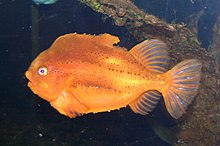Lumpsuckers
| Lumpsuckers | |
|---|---|
 |
|
| Cyclopterus lumpus | |
| Scientific classification | |
| Kingdom: | Animalia |
| Phylum: | Chordata |
| Class: | Actinopterygii |
| Order: | Scorpaeniformes |
| Superfamily: | Cyclopteroidea |
| Family: |
Cyclopteridae Bonaparte, 1831 |
| Genera | |
|
De la Pylaie, 1835 |
|
De la Pylaie, 1835
Cyclopsis Popov, 1930
Cyclopteropsis Soldatov & Popov, 1929
Cyclopterus Linnaeus, 1758
Eumicrotremus Gill, 1862
Georgimarinus Voskoboinikova & Nazarkin, 2015
Lethotremus Gilbert, 1896
Microancathus Voskoboinikova, 2015
Lumpsuckers or lumpfish are mostly small scorpaeniform marine fish of the family Cyclopteridae. They are found in the cold waters of the Arctic, North Atlantic, and North Pacific oceans. The greatest number of species are found in the North Pacific.
The roe of Cyclopterus lumpus (the lumpsucker or lumpfish to most Europeans and people living along the East Coast of the United States), known as stenbider (literally "stone biter") in Danish, is used extensively in Scandinavian cuisine. The roe is also used as an affordable alternative to the caviar produced by sturgeons.
The family name Cyclopteridae derives from the Greek words κύκλος (kyklos), meaning "circle", and πτέρυξ (pteryx), meaning "wing" or "fin", in reference to the circle-shaped pectoral fins of most of the fish that comprise this family.
...
Wikipedia
